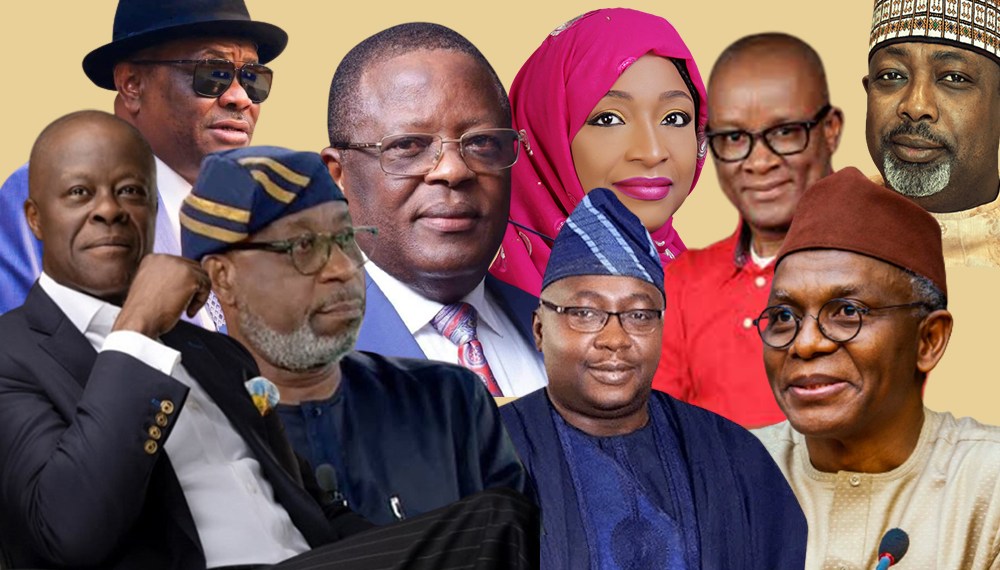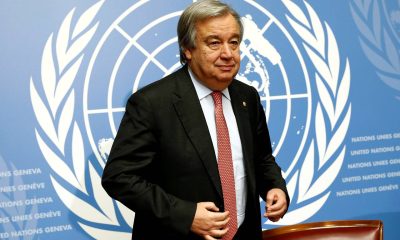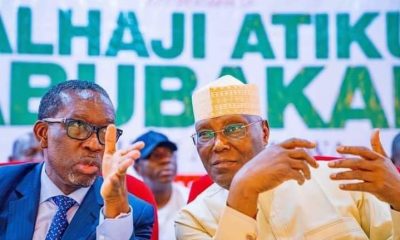POLITICS
2027 Elections: UN Urges Political Parties To Prioritise Policy, Ideas In Campaigns

As Nigeria anticipates the next election cycle, the United Nations has called on political parties to centre their campaigns on policy proposals and constructive ideas, steering clear of insults and divisive rhetoric.
Speaking at the Roundtable on Hate-Free Politics in Nigeria on Monday in Abuja, Mr. Mohamed Fall, the United Nations Resident and Humanitarian Coordinator in Nigeria, outlined key recommendations as the 2027 elections approach.
“First, political parties must lead by example. Campaigns should emphasise policies and ideas, not insults or divisive rhetoric.”
“Second, parties should commit to codes of conduct that reject hate speech and promote factual information. Third, cooperation with media and digital platforms is essential to prevent the amplification of harmful content while ensuring voters have access to factual and reliable information.”
“Above all, we must remember that elections are about people – their dignity, rights, and future. Hate speech strips people of their dignity and undermines the very foundation of democracy.
“As leaders, you have the power and the responsibility to set the tone and demonstrate to Nigerians that politics can be conducted with respect, truth, tolerance, and integrity.”
Mr. Fall added, “On this International Day of Democracy, I urge you to work together to ensure democratic participation in Nigeria is free from hate, grounded in factual information, and respectful of human rights.
“Let us affirm that words matter and that by choosing our words carefully, we choose peace, unity, and progress for Nigeria. Let us act collectively to strengthen and protect democracy within and beyond Nigeria.”
He emphasised that this year’s International Day of Democracy, themed “Democracy and Inclusion in an Age of Insecurity,” should serve as a reminder that democracy is not just about holding elections, but also about ensuring inclusion, pluralism, and the meaningful participation of everyone in a respectful and inclusive manner.
“When falsehoods spread unchecked, especially during elections, they erode public trust, mislead citizens, and undermine democratic choices. Promoting information integrity means ensuring that Nigerians can access reliable information, that public debate is grounded in facts, and that voters are empowered to make informed choices free from manipulation.”
He insisted, “In Nigeria, the stakes are high. Vibrant political discourse and engagement should be moments of unity and pride. However, they can become harmful if hateful language and hostile narratives are allowed and accepted, inciting hostility and potentially leading to violence. History has shown us that hate speech has been a precursor to some of the worst atrocities, including genocide.”
“The Rabat Plan of Action, endorsed by the United Nations, reminds us that advocacy of national, racial, or religious hatred that incites discrimination, hostility, or violence must be prohibited by law, and that these laws must comply with international human rights standards, including the rights of association, expression, and assembly.”
“This is a cornerstone of democracy. Restrictions must be lawful, necessary, and proportionate, and never used as a pretext to silence debate.
“The challenge before us today is to strike the right balance: engaging in open political discourse while safeguarding freedom of expression and protecting Nigerians from the harms of hate speech.”
Dr. Tony Ojukwu, Executive Secretary of the National Human Rights Commission (NHRC), noted that Nigeria has made significant progress in democratic development since the return to civilian rule in 1999.
He said, “We have witnessed successive electoral cycles, the strengthening of civil society, and the expansion of political space. Yet, our democracy remains a work in progress.
Challenges such as low voter turnout, weak internal democracy within political parties, electoral violence and malpractices, weak institutional accountability, limited inclusion of women, youth, and persons with disabilities, and harsh political climates continue to undermine public trust and democratic consolidation.
“Above all, our democratic and political processes, including communication, have often faced immense challenges stemming from poor values and deep-seated, hate-filled, and divisive rhetoric that threatens the core foundation of our nationhood.”
He noted, “The National Human Rights Commission has been at the forefront of efforts to promote ethical and hate-free politics in Nigeria, including during the 2023 elections.”
Dr. Ojukwu stated that hate speech is intricately related to human rights, both in its expression and its consequences.
“To the person spreading hate speech, it is about the right to freedom of expression, opinion, speech, or belief.
“To the recipient of hate speech, it is a violation of the rights to dignity and freedom from discrimination based on religious belief, political affiliation, ethnicity, gender, culture, or other characteristics, among other human rights.”
“When applied to politics, hate speech and unethical communications breed political divisions that facilitate violence, weaken voter participation, stifle pluralism, and undermine social cohesion.”
He said, “As we approach the 2027 General Elections, the NHRC is alarmed by the prevalence of hateful politics and unethical practices among some political actors. Establishing a culture of responsible and value-driven political processes remains a challenge for Nigeria, from the independence of the election management body to unethical actions by political parties, their candidates, and agents, and the inappropriate use of security and law enforcement agencies.”
“Vote buying and other forms of inducement during past and recent elections have become worrisome indicators of the fragility of Nigerian electoral culture, with severe consequences for freedom of association and the right to participation.”
He noted that, “The Roundtable on Ethical and Hate-Free Politics in Nigeria, convened in partnership with the United Nations, aims to foster a shared understanding of the drivers, patterns, and impacts of hate speech and unethical political communications in Nigerian electoral and democratic processes.
” It also seeks to secure practical, rights-based commitments from key actors to promote ethical politics, reduce hate speech, and protect pluralism and inclusive participation – especially for women, youth, persons with disabilities, and minority communities – in the electoral processes leading to the 2027 elections and beyond.”
-
CRIME4 years ago
PSC Dismisses DCP Abba Kyari, To Be Prosecuted Over Alleged $1.1m Fraud
-
FEATURED4 years ago
2022 Will Brighten Possibility Of Osinbajo Presidency, Says TPP
-
FEATURED2 years ago
Buhari’s Ministers, CEOs Should Be Held Accountable Along With Emefiele, Says Timi Frank
-
BUSINESS & ECONOMY2 years ago
Oyedemi Reigns As 2023’s Real Estate Humanitarian Of The Year
-
SPORTS2 years ago
BREAKING: Jürgen Klopp Quits Liverpool As Manager At End Of Season
-
SPORTS2 years ago
Could Liverpool Afford Kylian Mbappe For €200 million? Wages, Transfer Fee
-
ENTERTAINMENT2 years ago
Veteran Nigerian Musician, Basil Akalonu Dies At 72
-
FEATURED2 years ago
Tribunal Judgement: Peter Obi Warns Of Vanishing Electoral Jurisprudence, Heads To Supreme Court
-
BUSINESS & ECONOMY2 years ago
Oyedemi Bags ‘Next Bulls Award’ As BusinessDay Celebrates Top 25 CEOs/ Business Leaders
-
FEATURED3 years ago
2023 Presidency: South East PDP Aspirants Unite, Demand Party Ticket For Zone



































